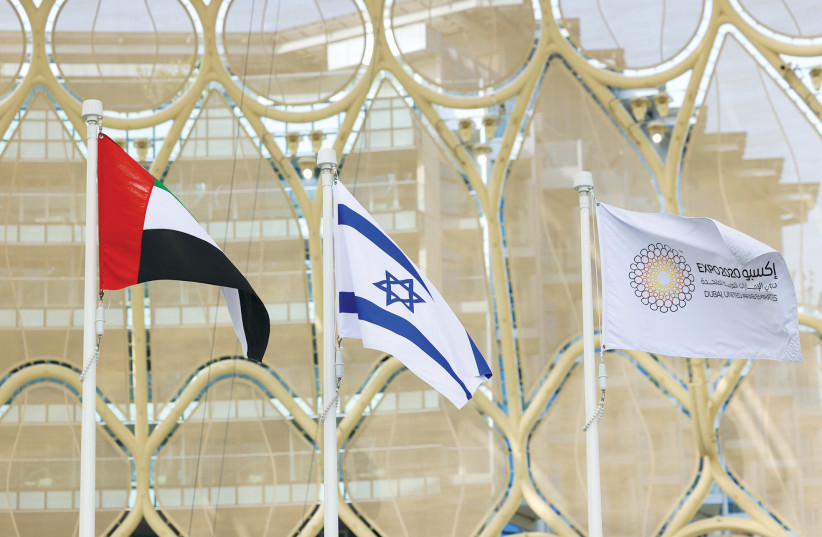AJC's new Abu Dhabi office embraces a new era of peace - opinion

The organization’s first office in an Arab or majority-Muslim state, will endeavor to serve as a nongovernmental bridge between Arabs and Jews, Emiratis and Israelis, and the US and the Gulf.
Since the August 2020 announcement of normalized relations between the United Arab Emirates (UAE) and Israel, and the signing of the historic Abraham Accords on the White House lawn the following month, there have been many firsts in a region ready to embrace a new era of peace.
Within days of that August announcement, memoranda of understanding were signed by UAE and Israeli companies on COVID-19 testing and other medical technology. This was the first in a cascade of business-to-business and government-to-government agreements over several months, from civil aviation to wildlife conservation, and taxation to cultural exchange.
The first El Al and Emirates flights. The first 100,000 Israeli visitors to the UAE, followed not long after, despite the pandemic, by the second 100,000. The UAE flag displayed for the first time in bright lights on the Tel Aviv municipal building in Rabin Square. The first Rosh Hashanah supplement published in Dubai’s Khaleej Times. News that an UAE and Israel free trade agreement, the first with an Arab state, was nearing completion.
In short order, embassies were opened in Tel Aviv and Abu Dhabi, with prominent diplomats dispatched by both countries and received with fitting ceremonies by heads of state. In the ensuing months, it could still bring a lump to the throat when the UAE national anthem, “Ishy Bilady,” was sung in Jerusalem, and the Israeli national anthem, “Hatikvah,” echoed through the central pavilion at the Dubai Expo, but in time, the extraordinary became commonplace.
Now comes the next important step in the transformation wrought by the Abraham Accords: The establishment of institutions and infrastructures that bring Arabs and Jews together, break down misunderstandings and mistrust, and create new and inclusive civil society networks. Several worthy people-to-people initiatives have been spawned in the wake of diplomatic normalization. But one preceded the 2020 breakthrough – by decades – and this week is entering a dramatic new phase.
On March 2, American Jewish Committee CEO David Harris will formally open AJC Abu Dhabi. The Sidney Lerner Center for Arab-Jewish Understanding (SLCAJU), headed by retired US Ambassador Marc Sievers, is building on more than 25 years of AJC engagement with the UAE government. Aside from experience with the UAE Ministry of Foreign Affairs and International Cooperation, the Ministry of Culture and Youth, and the Ministry of Tolerance, as well as with academic institutions, think tanks, interfaith organs, the business sector and the country’s growing Jewish community, the office will showcase the benefits and the potential for broader peace.
Through continuous contact with local partners, panel discussions on contemporary issues, lecture series, exchange programs, publications and other projects, AJC Abu Dhabi, the organization’s first office in an Arab or majority-Muslim state, will endeavor to serve as a committed, independent, nongovernmental bridge between Arabs and Jews, Emiratis and Israelis, and the United States and the Gulf.
While robust at the government-to-government level and in the realms of international business and finance, the importance of this last relationship is insufficiently understood among the general public. AJC, the global Jewish advocacy organization present in 24 US cities and 13 other countries, and known as a voice for common values, mutual respect and peace, can help paint a truer picture of the region for American audiences parallel to diplomatic channels and a truer picture of America for citizens of the Arabian Gulf States.
While US-Gulf trade and investment remain substantial, much has been written in recent years about the US’s supposed loss of interest in the Middle East, as Washington’s focus has shifted to other regions and to pressing domestic concerns. With the drawdown of US forces in Syria in 2018, the end of the combat mission in Iraq in 2021 and particularly after last summer’s troubled withdrawal from Afghanistan, US decline or retreat from the Greater Middle East have been common refrains in international policy forums.
These assessments are hyperbolic. With major air bases in the UAE and Qatar, a land forces base in Kuwait, an access agreement for the US Navy to Omani ports and the headquarters of the US Fifth Fleet in Bahrain, the American military still has some 60,000 personnel and the necessary assets to defend its interests and its allies in the region and in partnership with increasingly capable national forces. US diplomatic activity remains vigorous, including ongoing efforts to end the war in Yemen. And as the recent series of missile and drone attacks on the UAE by Yemen’s Iran-equipped Houthi rebels demonstrated, attacks that were countered by coordinated UAE and US forces, security cooperation between our countries remains strong and vital.
But keeping that cooperation strong, deepening awareness and appreciation between nations, peoples and faiths, will not happen on its own. Sustaining the natural, synergistic bonds between the UAE and the US, between the Gulf states and Israel, and between Arabs and Jews, so that all of these relationships reach their potential and fulfill the Abraham Accords’ promise, will require that kind of support the SLCAJU is committed to lend for years to come. It is a bold and necessary initiative.
The writer is the American Jewish Committee’s chief policy and political affairs officer, and has led the organization’s outreach in the Arab world since 1991.
Jerusalem Post Store
`; document.getElementById("linkPremium").innerHTML = cont; var divWithLink = document.getElementById("premium-link"); if (divWithLink !== null && divWithLink !== 'undefined') { divWithLink.style.border = "solid 1px #cb0f3e"; divWithLink.style.textAlign = "center"; divWithLink.style.marginBottom = "15px"; divWithLink.style.marginTop = "15px"; divWithLink.style.width = "100%"; divWithLink.style.backgroundColor = "#122952"; divWithLink.style.color = "#ffffff"; divWithLink.style.lineHeight = "1.5"; } } (function (v, i) { });

